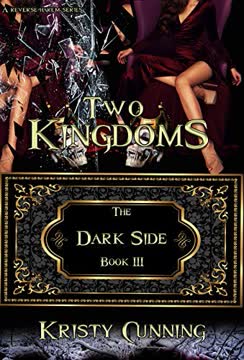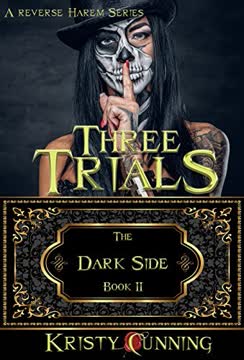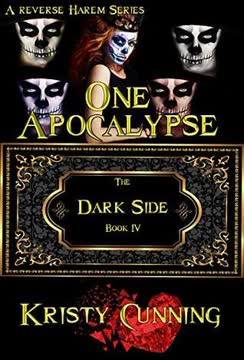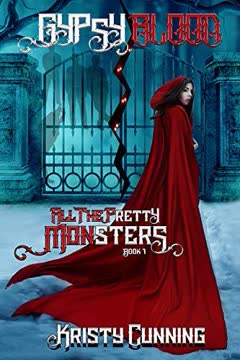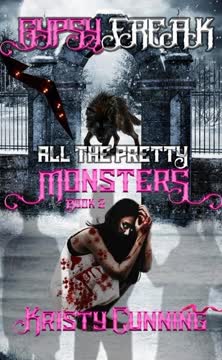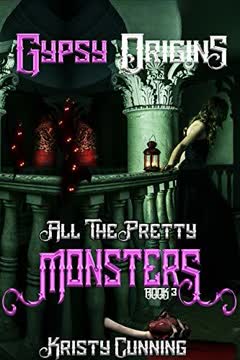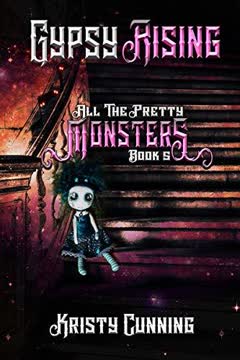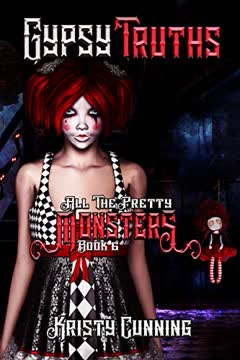Plot Summary
Devil's Bargain, Daughter's Terms
Paca, the Devil's daughter, faces Lucifer in a tense negotiation, determined to secure freedom and power for her four Horsemen—her lovers and protectors. She demands their access to hell, the ability to come and go, and restoration of her personal artifacts. Lucifer, amused and cryptic, agrees with little resistance, unsettling Paca with his lack of manipulation. The exchange escalates into a sword fight, a ritual from their past, where Paca's muscle memory and raw determination allow her to best Lucifer. She wins the deal, but Lucifer's parting words reveal she already had most of what she asked for, and that he was simply "fucking with her." Paca leaves hell, uncertain of her own power and the true nature of her father's games.
Homecoming and Heated Reunions
Back home, Paca's reckless solo mission infuriates her Horsemen—Jude, Kai, Gage, and Ezekiel. Their anger masks deep worry and fear for her safety, highlighting the fragile trust and emotional distance between them. Paca tries to deflect with humor, but the group's dynamic is strained by secrets, half-truths, and the lingering trauma of their shared deaths. Despite the tension, Paca reveals the terms of her deal with Lucifer, granting the Horsemen new power and freedom. Yet, the revelation that Lucifer knows she lacks her memories unsettles everyone, and the group is left grappling with the implications of their past and the uncertainty of their future.
Past Lives, Present Lovers
Paca delves into journals chronicling her and the Horsemen's many past lives, from Vikings to queens, uncovering patterns of love, violence, and betrayal. The group's sexual and emotional bonds are complex, shaped by centuries of shared history and shifting power dynamics. Paca's struggle to reclaim her memories and identity is mirrored in her relationships—she is both the center and the outsider, craving the deep connection she once had but now only feels in echoes. The Horsemen, too, are haunted by what they've lost, and their attempts to protect Paca often clash with her need for agency and truth.
Balance and Betrayal
Paca seeks out Lamar, her former confidant, to understand the concept of balance that defines her existence. She learns that her unique power lies in being "selflessly selfish"—every decision she makes must serve both herself and others to maintain her equilibrium. This balance is both her strength and her curse, making her indispensable but also vulnerable to manipulation and betrayal. The group's dynamic is further complicated by the revelation that Paca's siblings, each embodying a deadly sin, may have played a role in her and the Horsemen's deaths. Trust is scarce, and every alliance is fraught with the potential for treachery.
Sibling Rivalries and Royal Games
At a royal gala in hell, Paca is thrust into the dangerous games of her siblings—Lilith, Hera, Cain, Manella, and the Gemini Twins. Each sibling is a force of chaos, their alliances and enmities shifting with every slight and power play. Paca's presence is both a threat and a prize, and her interactions with her siblings are laced with envy, lust, and old wounds. Lucifer's manipulation is ever-present, orchestrating events to force Paca into the spotlight and test her loyalty. The party becomes a battleground for dominance, with Paca struggling to assert herself while navigating the treacherous currents of hellish royalty.
Nightmares and New Powers
Paca and the Horsemen are plagued by recurring nightmares of torture in Hell's Black Heart, a prison for the most unbalanced souls. These dreams are not just memories but warnings, linking their past suffering to their current vulnerability. When Paca's nightmare nearly destroys their home, the group realizes the depth of their bond—only together can they find peace and strength. The experience triggers new powers and transformations, hinting at the untapped potential within each of them. Yet, the trauma lingers, and the fear of losing each other again drives them to seek answers and prepare for the battles ahead.
The Rebel Uprising
A sudden attack by rebel forces and monstrous beasts threatens hell's stability. Paca and the Horsemen, now wielding new weapons and powers, fight side by side to repel the invaders. Their unity and strength are on full display, and Paca's leadership is cemented as she unleashes her apocalyptic power to restore balance. The victory is bittersweet, as it marks their public return and paints a target on their backs. Lucifer seizes the moment to reintroduce them as the Four Horsemen and The Apocalypse, signaling that their true purpose is about to be tested on a cosmic scale.
Family Reunion, Angelic Judgment
A forced family reunion brings Paca, her siblings, Lucifer, and a council of haggard angels—including Rafael, her killer—face to face. The angels and devils argue over Paca's role in the coming apocalypse, each side blaming the other for the world's impending doom. Paca is subjected to brutal tests to prove her identity and intentions, culminating in an illusion where she witnesses the Horsemen's deaths and is pushed to the brink of her power. The experience leaves her broken but resolute, and the lines between good and evil blur as both sides reveal their capacity for cruelty and self-interest.
Purgatory's Deadly Trials
Banished to purgatory, Paca and the Horsemen must navigate a desolate, monster-infested landscape. The trials are both physical and psychological, designed to test their unity, resolve, and ability to adapt. Time and reality are distorted, and every victory is met with new dangers. The group's banter and bickering mask their growing fear and desperation, but their bond deepens as they rely on each other to survive. The experience forces them to confront their limitations and the true nature of the threat they face—a primordial evil that cannot be defeated by strength alone.
The Truth of the Apocalypse
Through a series of confrontations and visions, Paca learns the truth about her creation: she is a weapon, designed as a failsafe to destroy the world if pure evil—Jahl—ever escapes. Her balance, the source of her power, was compromised when she shared it with the Horsemen, making her too weak to fulfill her original purpose. Her death at the hands of Rafael was orchestrated to restore the cosmic balance, but it also allowed her to return, changed and uncertain. The realization that she is both savior and destroyer weighs heavily on Paca, and she must decide whether to embrace her destiny or forge a new path.
The Weapon and the World
Paca confronts Harold, the angel who betrayed her, and grapples with the implications of being a living weapon. She is told that she cannot escape her purpose, but her unique balance and the bond with her Horsemen may offer a way to defeat Jahl without annihilating the world. The conversation is fraught with blame, regret, and the lingering pain of betrayal. Paca's struggle for agency is at the heart of her journey—she refuses to be used by angels or devils, seeking instead to reclaim her power on her own terms.
The Crown and the Curse
Paca discovers that her coveted crown—a symbol of her authority and identity—has been transformed into a lower back tattoo by her mischievous sister Lilith. The choice between reclaiming her crown or tormenting her sibling becomes a metaphor for the sacrifices required to maintain balance. The group's camaraderie is tested as they prepare for the final confrontation, each member grappling with their own fears and desires. The playful rivalry and banter mask the gravity of their situation, but the underlying loyalty and love are undeniable.
Training for the End
With the threat of Jahl looming, Paca and the Horsemen train relentlessly, seeking to unlock their full potential. Visits to Hell's Black Heart grant them new powers and transformations, but also expose them to greater risks. The group's dynamic shifts as old wounds heal and new bonds are forged—love, jealousy, and rivalry intertwine, strengthening their resolve. Paca's leadership is tested as she must balance her own needs with those of her harem, and the weight of destiny grows heavier with each passing day.
Facing the Beast
The group finally glimpses the true form of Jahl—a monstrous, primordial force that defies comprehension. The sight terrifies even the fearless Paca, shattering her bravado and forcing her to confront her deepest insecurities. The realization that she may not be strong enough to defeat Jahl without sacrificing herself or her Horsemen is a sobering blow. Yet, the group's unwavering support and love give her the strength to keep fighting, even in the face of overwhelming odds.
Love, Loyalty, and Level-Ups
Amidst the chaos and uncertainty, moments of tenderness and vulnerability emerge. Gage confesses his love for Paca, breaking through her defenses and offering a glimpse of hope. The group's loyalty is reaffirmed as they choose to stand by her, no matter the cost. These emotional breakthroughs are as vital as any power or weapon, reminding Paca that her greatest strength lies not in destruction, but in the bonds she has forged.
The Price of Power
As the group prepares for the final battle, Paca is haunted by regret—not guilt, but the deep, unshakable sorrow of having hurt those she loves, including Lucifer. She realizes that every choice has a cost, and that true power comes with responsibility. The journey has changed her and her Horsemen, forging them into something greater than the sum of their parts. The stage is set for the ultimate confrontation, and Paca must decide what kind of weapon she will be—a destroyer, a savior, or something entirely new.
Characters
Paca (The Apocalypse)
Paca is the youngest daughter of Lucifer, created as a living weapon to destroy the world if pure evil escapes. Her unique power lies in her perfect balance—every decision must serve both herself and others. She is witty, irreverent, and fiercely independent, but also deeply vulnerable, haunted by the loss of her memories and the weight of her destiny. Her relationships with the Horsemen are central to her identity, providing both strength and conflict. Paca's journey is one of self-discovery, as she struggles to reclaim her agency and redefine her purpose beyond being a tool for angels or devils.
Lucifer
Lucifer is the ruler of hell and Paca's creator, a master manipulator who oscillates between affection and cruelty. His love for Paca is genuine but often expressed through games and tests, making him both protector and antagonist. He is tormented by regret over Paca's death and the role he played in her suffering, and his sanity is closely tied to her presence. Lucifer's motivations are complex—he seeks to maintain balance, protect his domain, and outmaneuver his angelic rivals, all while grappling with the consequences of his own actions.
Jude (Death)
Jude embodies the Horseman of Death, a figure of wrath and intensity. He is often the most confrontational and emotionally volatile of the group, quick to anger but deeply protective of Paca and his brothers. Jude's relationship with Paca is marked by rivalry, passion, and a need for control, but beneath his tough exterior lies a profound fear of loss and abandonment. His development is tied to learning vulnerability and trust, both in himself and in Paca.
Kai (Conquest)
Kai is the Horseman of Conquest, known for his sharp tongue and playful banter. He is often the mediator in the group, using humor to diffuse tension and mask his own insecurities. Kai's relationship with Paca is flirtatious and competitive, but he is also deeply invested in her well-being. His journey involves reconciling his need for validation with his capacity for genuine love and sacrifice.
Gage (Famine)
Gage represents Famine, the most reserved and introspective of the Horsemen. He is a stabilizing force in the group, offering comfort and support when others falter. Gage's love for Paca is steady and unwavering, culminating in a heartfelt confession that breaks through her defenses. His development centers on embracing vulnerability and allowing himself to be loved in return.
Ezekiel (War)
Ezekiel is War, a master tactician and the most pragmatic of the Horsemen. He is often the voice of reason, but his stoicism can come across as cold or detached. Ezekiel's bond with Paca is rooted in mutual respect and shared trauma, and he struggles to balance his need for control with his growing emotional dependence on her. His arc is about learning to trust and let go, both in battle and in love.
Lamar
Lamar is Paca's former best friend and a spirit balancer in hell. He serves as a guide and sounding board, helping Paca navigate the complexities of her power and relationships. Lamar's loyalty is unwavering, but he is also capable of manipulation and self-preservation. His role is to challenge Paca's assumptions and push her toward growth, even when it means risking their friendship.
Lilith
Lilith is Paca's eldest sister, embodying the sin of envy. She is a constant rival, using cunning and manipulation to undermine Paca at every turn. Their relationship is a mix of sibling rivalry and reluctant respect, with Lilith serving as both antagonist and mirror to Paca's own flaws. Lilith's actions often force Paca to confront her own desires and insecurities.
Rafael
Rafael is the archangel who killed Paca, believing it necessary to restore balance. He is rigid, self-righteous, and deeply conflicted about his actions. Rafael's interactions with Paca are fraught with blame and regret, and he serves as a foil to her quest for agency. His development is tied to recognizing the limits of purity and the dangers of absolute judgment.
Harold (Heratio)
Harold is the angel who betrayed Paca, helping orchestrate her death. Now living topside as a pawn shop owner, he is burdened by guilt and resentment. Harold's relationship with Paca is adversarial, marked by mutual blame and a shared history of pain. He provides crucial information but remains emotionally distant, embodying the complexities of forgiveness and redemption.
Plot Devices
Memory Loss and Reincarnation
Paca's amnesia and the Horsemen's fragmented memories create a sense of mystery and urgency, driving the plot as they seek to uncover the truth of their past lives and deaths. This device allows for exploration of identity, agency, and the cyclical nature of trauma and healing. It also enables the gradual revelation of key information, building suspense and emotional resonance.
Balance and Duality
The concept of balance—between selflessness and selfishness, good and evil, love and destruction—is woven throughout the narrative. Paca's unique ability to maintain equilibrium is both her greatest strength and her Achilles' heel, influencing every major decision and relationship. The duality of her nature is mirrored in the world around her, where angels and devils are equally capable of cruelty and compassion.
Foreshadowing and Prophecy
Prophecies, visions, and cryptic journal entries foreshadow the coming apocalypse and the role Paca and the Horsemen must play. These elements create a sense of inevitability, heightening tension and forcing characters to confront their fears and desires. The use of riddles and puzzles adds layers of complexity, challenging both characters and readers to piece together the truth.
Power Level-Ups and Transformations
Physical and magical transformations—triggered by emotional breakthroughs, battles, or visits to Hell's Black Heart—serve as milestones in the characters' development. These level-ups are both rewards and burdens, granting new abilities while exposing vulnerabilities. The transformations also symbolize the characters' evolving relationships and the shifting balance of power within the group.
Metafictional Humor and Self-Awareness
Paca's irreverent humor, pop culture references, and self-aware commentary provide levity amidst the darkness, making her a relatable and engaging protagonist. This device also allows for critique of genre conventions and subversion of expectations, keeping the narrative fresh and unpredictable.
Analysis
Two Kingdoms is a darkly witty, genre-bending exploration of power, identity, and the cost of destiny. Kristy Cunning crafts a world where the lines between good and evil are blurred, and where agency is hard-won in the face of cosmic manipulation. At its core, the novel is about the struggle to define oneself beyond the roles imposed by others—be they family, lovers, or fate itself. Paca's journey from weapon to woman, from pawn to player, is both a subversion of the chosen-one trope and a meditation on the necessity of balance in all things. The book's blend of humor, romance, and existential dread speaks to a modern audience grappling with questions of autonomy, trauma, and the search for meaning in a chaotic world. Ultimately, Two Kingdoms suggests that true power lies not in destruction or purity, but in the messy, imperfect bonds we forge—and the courage to choose our own path, even when the odds are impossible.
Last updated:
Review Summary
Two Kingdoms received mixed reviews, with an average rating of 4 out of 5 stars. Many readers found the book less engaging than its predecessors, citing slow pacing, excessive world-building explanations, and a lack of character development. Some appreciated the humor and plot revelations but felt the romance and action were lacking. Several reviewers expressed disappointment with the reduced steam level and repetitive dialogue. Despite criticisms, many fans remained invested in the series and looked forward to the final installment.
The Dark Side Series
Similar Books
Download PDF
Download EPUB
.epub digital book format is ideal for reading ebooks on phones, tablets, and e-readers.
